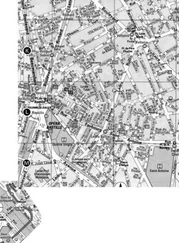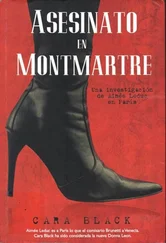“He’s in charge of a unit there,” the receptionist said.
“Since when?”
But the receptionist had already patched her through. Several clicks, then a sustained buzz, and then the phone was picked up. “Groupe R,” came Morbier’s voice on the line.
What was Morbier doing in the special branch? “Got a new job?”
“Temporary assignment, Leduc,” Morbier said, his voice gruff.
In the background she heard the murmur of voices, the noise of an ancient Teletype, still in use in this age of computers, echoing off stone walls.
“Weren’t you going to tell me, Morbier?” She didn’t wait for an answer. “Clue me in on the secrets d’état .”
A slight pause. “I’ve got another call,” Morbier said.
He seemed bent on stonewalling her. His hand muffled the receiver. She heard indistinct conversation, then recognized his hacking cough. Almost a two-pack-a-day man.
“Leduc, I’m busy.”
“Everyone in Paris either works frantically or collects le dole ,” she said. “So what else is new?”
He put his hand over the receiver again.
“Let’s meet for lunch and you can tell me all about your new job,” she said.
“Things seem tight….”
“I think you’ll be interested in what I have to say,” she said. “I’m in the Sentier, but you name the place.”
“MAKE IT good, Leduc,” Morbier said over the dog-eared menu. “I don’t have much time.”
Outside, hookers plied their trade by the open brasserie window.
“Does murder qualify?”
“Important things first. We order.”
A true Gallic response. His mismatched socks—one tan, the other brown—his suspenders, and wrinkled jacket were as usual but he seemed different.
“Order the formule ,” Morbier said. He didn’t look up but pointed to the blackboard, where “59 francs” had been chalked. “Cart-pusher’s special, but worth it.”
A promising scent of garlic and rosemary wafted from the black hole of a kitchen.
“The chef’s from Marseilles,” he said. “His son’s on parole.”
Aimée hated that. It meant no bill and general toadying-up from the poor staff. They ordered the formule from a gap-toothed young woman, who wore an apron over her jeans.
The brasserie bustled with a late lunch crowd: auto mechanics, white-haired ladies with full shopping bags from the outdoor marche at their feet, African security guards nursing bières , and stockbrokers from the nearby Bourse.
“ Tant pis , my Marie’s teething,” Aimée overheard a tinsel-wigged hooker say to her sidewalk mate. Her mate, a middle-aged woman, adjusted an orange latex miniskirt, her eyes never leaving the passersby. “My sitter’s complaining,” the woman continued, “ alors , that’s all the sitter ever does, that one!”
Why had Morbier chosen this place?
“Jean Jaurès was stabbed at that table, Leduc,” Morbier said. “The bloodstains are still there.”
Aimée looked over. A dark brown ghoulish stain, shaped like a butterfly, spread over the old table.
“As always, Morbier, you pick the scenic and informative.” She set the menu down. “Food any good?”
Was this her socialist lesson for the day? When she was in grade school, he’d insisted she read the transcript of Julius and Ethel Rosenberg’s trial, even quizzed her about it.
From the next table came the tang of a Gauloise. The acrid smoke teased her. Too bad she’d quit. The second time this week.
And then it hit her.
“You quit smoking, Morbier?”
He pointed to the patch on his arm.
“I’m full of surprises today, eh, Leduc?”
The waitress set two bowls of Provençal soupe au pistou in front of them, swirls of basil crème in the center.
“My visit to Berlin generated some interest.”
“And you’re proud of that, Leduc?”
“I wouldn’t say that.” She took a big swig of the rose, light and with a peachlike aroma.
Not bad. She took another.
“Tell me about this murder while I eat,” Morbier said.
She told him about Jutta Hald. “She said she’d been in prison with my mother and would give me her things, but she needed money,” Aimée said. “Later she called to say there was something I should know about my mother, but I got to the meeting too late. Jutta’s brains were all over the tower wall.” She watched Morbier run the napkin across his mouth, then snap toothpicks between his splayed fingers.
“Doesn’t sound pretty.”
She told him about Jutta’s photo of Romain Figeac, Christian’s behavior, and the blood-smudged wall. “Figeac didn’t commit suicide, Morbier, he was murdered.”
“And you can prove that?”
“Serge at the morgue concurs,” she said, hoping Morbier wouldn’t check up on her stretch of the truth. “Both Figeac and Jutta Hald were killed by high-caliber gun blasts. Serge has the evidence Baggie for testing but I know it’s the same gun.”
“What do you want from me?” Morbier sighed.
“I know it’s related to my mother.”
“Leduc, I can’t help you anymore.”
“Attention, c’est chaud,” the waitress interrupted, wedging two heaping plates of grilled rougets , the brilliant red fish skin still crackling, in front of them. Thyme and olive oil aromas filled the air.
She felt sure the Berlin trip, to investigate clues to her father’s death, from which she’d just returned had kick-started Jutta’s effort to contact her. She pulled out the paper she’d taken from Romain Figeac’s desk.
“Figeac wrote ‘agit888’ and ‘Frésnes,’ the prison where Jutta and my mother were held,” she said. “Know anything about it?”
His eyebrows knit in concentration. “How old are you?”
He should know. She’d been nine when he and her father assembled her bike over a bottle of wine on a long-ago Christmas Eve. She’d watched from behind a door. The bike had always wobbled.
“You know a woman never reveals her age.”
“Will you let me eat in peace?”
She nodded.
Morbier tucked his napkin into his collar, spreading it over his suspenders. “All I know, which isn’t much, is that sometime in the early eighties a number of RAD members—”
“RAD?” Aimée interrupted.
“The Red Army Division,” he said. “Some German fugitive terrorists wanted to leave the underground. They were given a chance to lead new lives in East Germany, under different names.
“So by Red Army Division,” she said, dipping her bread in the sauce, and keeping her hand steady with effort, “you mean the seventies Haader-Rofmein gang who blew up banks and kidnapped people?”
“The newspapers called them that.” Morbier took a long sip of rose. He raised his thick eyebrows. “They called themselves the RAD. Their French counterparts were Action-Réaction.”
This fit what Jutta had told her.
“This came out in the late eighties when some ex-terrorists living in East Germany were arrested. Then the Wall came down.”
“What’s the connection to agit888?”
“Thank Jean-Paul Sartre for that,” Morbier said, attacking the rouget with gusto.
“Sartre?”
“The Marxist fool interviewed Haader in his cell,” he said. “And gave that infamous press conference about terrorists. For that the Ministry of Interior kept Sartre under surveillance until he died.” Morbier made a moue of distaste. “Your tax francs at work.”
“Sounds convoluted to me.”
“Agit888 is what they called the Sartre surveillance squad.”
Aimée thought old Sartre would have been secretly pleased. An existential thorn in the establishment’s side until the end.
Читать дальше











